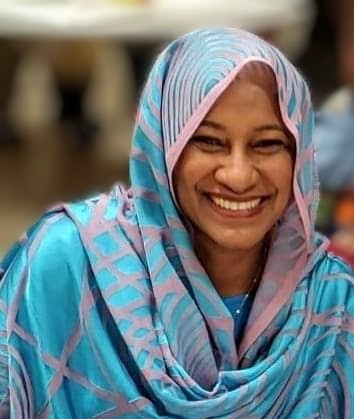SIT alumna brings conflict transformation skills to new role
Dr. Asma Ali Abunaib is DEI director for Vermont's Champlain Valley School District
October 18th, 2022 | Careers, SIT Graduate Institute

Dr. Asma Ali Abunaib, a 2013 graduate of SIT Graduate Institute, is fond of saying certain things were “meant to be.” Kismet sidesteps the patience, perseverance, and hard work that put Asma on the path to where she is today—director of Diversity, Equity, and Inclusion for the Champlain Valley School District in Vermont. But one chance meeting did seem to set the ball in motion.
With a BS from Gezira University in Sudan and a diploma in Peace and Development Studies from Juba University, Khartoum, in South Sudan, in 2008 Asma was working with the United Nations Office for the Coordinator of Humanitarian Affairs in Sudan.
Invited to attend a conference that year, she almost didn’t go. “There were 100 reasons to cancel going to that conference, but I decided to go at the last minute,” says Asma. By chance, she encountered a woman from Cairo who asked Asma for a copy of a report she had written. They had a five-minute conversation and exchanged business cards. When Asma returned home she received an email from the woman that included a link to the SIT CONTACT summer peace-building program.
“She thought that because of where I worked, CONTACT would be a very good fit for me,” Asma recalls. “I applied and within three days I received my acceptance. I always say it was meant to be.”
What started at CONTACT in 2009 eventually grew into an MA in Intercultural Service, Leadership, and Management from SIT in 2013, where Asma’s capstone research focused on the experiential learning cycle for non-western learners. Later, that research dovetailed with an opportunity at the University of Vermont, where Asma was working on her EdD in educational leadership and policy studies.
Searching for a summer job, Asma contacted the Champlain Valley Office of Economic Opportunity, which had a project to develop financial empowerment for new Americans. Asma’s dissertation on culturally responsive adult education for non-western learners was aligned, so she accepted the position and designed a facilitators’ guide and three curricula for financial capability.
After completing her EdD, Asma began working with the same nonprofit as New American Financial Empowerment project manager. She was also a senior advisor with Three Stones International, a Rwandan-based consultancy started by SIT alumnus Jesse Rouette,
We caught up with Asma over the summer, not long after she started her new DEI role at Champlain Valley Schools, where she works with a culurally and linguistically diverse community that includes not only native Vermonters but also West Africans who speak French and Swahili, Nepali-Bhutanese, people from the Middle East, Bantu speakers from Somalia, and those from many Spanish-speaking countries.
Do you consider CONTACT to have been a formative experience?
It was a great experience. I had never been in such a diverse community among people from a lot of countries that had similar situations as mine. I learned a lot from those participants. It was a turning point in terms of how I was looking at conflict and how I dealt with it in my work.
At CONTACT I started thinking differently about listening to other parties to the conflict.
There were two main things I benefited from: the experiential learning cycle and the cycle of revenge and reconciliation. That was very powerful and it gave me a framework to think through the violence situations that I was working on. At that point in the cycle, I think I was dehumanizing the enemy, so I wasn’t willing to work with them or talk to them. I was listening to one side. At CONTACT I started thinking differently about listening to other parties to the conflict.
After that, I worked in a consultancy for the UN and others. I had the privilege of choosing what I wanted to do so I started choosing more projects that could introduce me to those who were considered the perpetrators. I got to know them better and started to understand why they were doing what they were doing. I recognized how the dehumanizing part of the cycle had affected me and some of them.
Is there something that stands out for you in that experience?
I can’t say that things have worked in terms of where we are now in Sudan. There is still a lot happening. But my work was focused on listening to the grassroots, trying to share the different opinions of the conflict parties with each other and hearing what they had to say so those perspectives could be included in negotiations in Doha. I think we did that well.
What drew you to this new role?
It is not far from what I was doing in Sudan, actually. One of the reasons for the conflict in Sudan had to do with diversity and tribalism, so inclusion was always in my mind. This job is to increase the inclusivity of the programs and with more members of New American communities participating in the activities. So, it’s about inclusivity and it encompasses peace-building. Talking to parents, including immigrant parents, has given me knowledge about what is needed to make them feel more included in the education system.
